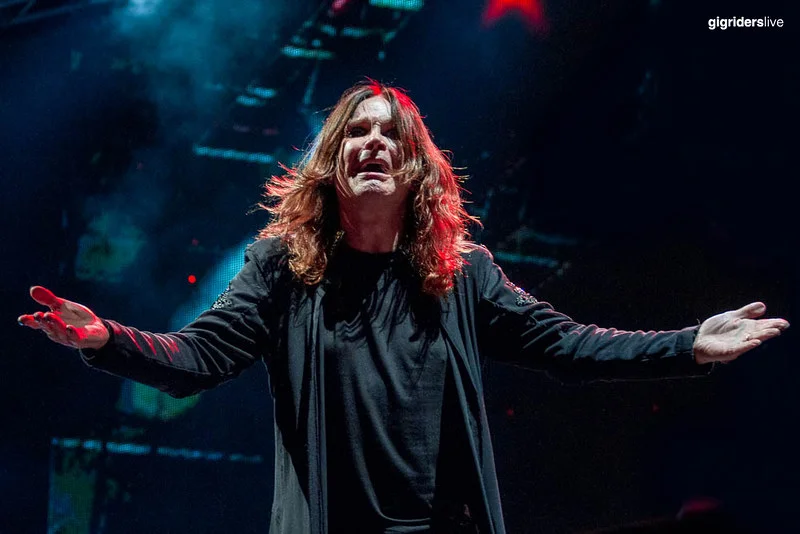Ozzy Osbourne, the former frontman of Black Sabbath known for his dark vocals and extreme behavior, which catapulted him into a successful solo career, has died at age 76.
“It is with more sadness than mere words can convey that we have to report that our beloved Ozzy Osbourne has passed away this morning,” a statement released on Tuesday, July 22, said. “He was with his family and surrounded by love. We ask everyone to respect our family privacy at this time.” No cause of death was provided.
His death comes just weeks after Black Sabbath’s final concert on July 5, which raised $190 million, making it the highest-grossing charity concert of all time.
Osbourne was known for his unique vocal abilities, with a sharp timbre and powerful delivery that helped define the heavy metal genre starting with Black Sabbath in 1970. His persona, characterized by morbid lyrics and funereal attire, earned him the nickname “The Prince of Darkness.” Osbourne once humorously remarked to British GQ in 2004, “They all thought I lived in some Bavarian castle and at midnight my bat wings came out and I flew around the battlements.”
Osbourne’s solo career began in 1980 and was marked by a series of notorious antics, including biting the head off a live dove and a dead bat, and urinating on a monument in Texas, which led to a decade-long ban from San Antonio. He attributed these actions to profound intoxication and expressed regret over an incident where he tried to strangle his wife, Sharon, an act he didn’t recall committing. “It’s one of the most regretful things,” he told British GQ. “Thank God, she dropped the charges. And still, I didn’t stop drinking.”
Despite his controversial actions, Osbourne acknowledged the publicity value of his behavior, stating in a 1991 interview with Rock Hard Magazine, “Part of me is happy because rock ‘n roll is a sensationalist business. If you haven’t got controversy, you haven’t got rock ‘n roll.”
In the early 2000s, Osbourne became an unlikely television star with the MTV reality series “The Osbournes,” portraying him as a lovable, albeit eccentric, family man. “I’m just a zany ham,” he told The Philadelphia Inquirer in 2018. “It’s all entertainment.”
Osbourne was inducted into the Rock and Roll Hall of Fame with Black Sabbath in 2006. All nine albums he recorded with the band went gold, with five achieving platinum status. As a solo artist, he released successful albums like 1991’s “No More Tears,” which peaked at No. 7 on the Billboard 200 chart and sold over 3 million copies in the U.S. His creation of Ozzfest in 1996 became one of the most successful heavy metal festival tours.
Born John Michael Osbourne on Dec. 3, 1948, in Birmingham, England, he was the fourth of six children. Struggling with undiagnosed dyslexia and attention deficit disorder, he found solace in music. Inspired by The Beatles, he pursued a career in music after a brief stint in Winson Green Prison for burglary.
Osbourne’s first major break came in 1967 with Geezer Butler’s band Rare Breed, leading to the formation of Black Sabbath. The band’s self-titled debut and follow-up “Paranoid” became significant hits, establishing their dark, heavy sound.
Despite his success, Osbourne faced personal struggles with substance abuse and was eventually fired from Black Sabbath in 1979. Encouraged by Sharon Arden, he embarked on a solo career with albums like “Blizzard of Ozz” and “Diary of a Madman.” Tragedy struck in 1982 when guitarist Randy Rhoads died in a plane crash.
Osbourne and Sharon married four months later, and he continued to achieve solo success, with albums consistently reaching gold status. In 2011, Black Sabbath reunited for a tour and the album “13,” marking their first new work in over 30 years.
Osbourne is survived by his first wife, Thelma Riley, their two children, Jessica and Lewis, and adopted son Eliot, as well as his second wife Sharon and their children, Aimee, Kelly, and Jack.
In later years, Osbourne embraced sobriety and reflected on his unexpected career longevity. “My life has just been unbelievable,” he told Rolling Stone in 2018. “You couldn’t write my story; you couldn’t invent me.”

























